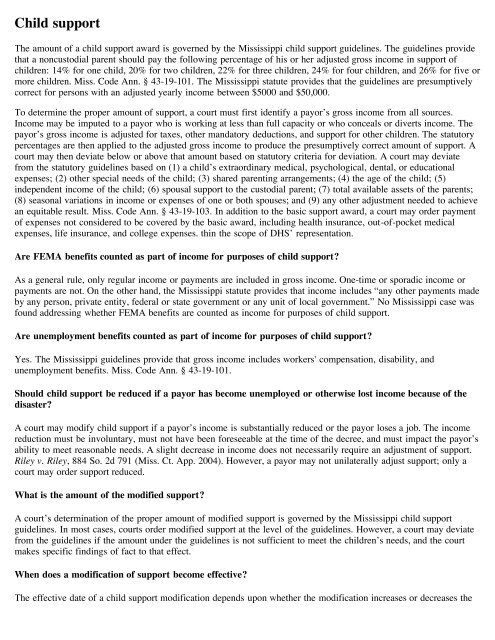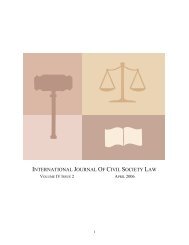Hurricane Katrina: Legal Issues - Columbus School of Law
Hurricane Katrina: Legal Issues - Columbus School of Law
Hurricane Katrina: Legal Issues - Columbus School of Law
Create successful ePaper yourself
Turn your PDF publications into a flip-book with our unique Google optimized e-Paper software.
Child support<br />
The amount <strong>of</strong> a child support award is governed by the Mississippi child support guidelines. The guidelines provide<br />
that a noncustodial parent should pay the following percentage <strong>of</strong> his or her adjusted gross income in support <strong>of</strong><br />
children: 14% for one child, 20% for two children, 22% for three children, 24% for four children, and 26% for five or<br />
more children. Miss. Code Ann. § 43-19-101. The Mississippi statute provides that the guidelines are presumptively<br />
correct for persons with an adjusted yearly income between $5000 and $50,000.<br />
To determine the proper amount <strong>of</strong> support, a court must first identify a payor’s gross income from all sources.<br />
Income may be imputed to a payor who is working at less than full capacity or who conceals or diverts income. The<br />
payor’s gross income is adjusted for taxes, other mandatory deductions, and support for other children. The statutory<br />
percentages are then applied to the adjusted gross income to produce the presumptively correct amount <strong>of</strong> support. A<br />
court may then deviate below or above that amount based on statutory criteria for deviation. A court may deviate<br />
from the statutory guidelines based on (1) a child’s extraordinary medical, psychological, dental, or educational<br />
expenses; (2) other special needs <strong>of</strong> the child; (3) shared parenting arrangements; (4) the age <strong>of</strong> the child; (5)<br />
independent income <strong>of</strong> the child; (6) spousal support to the custodial parent; (7) total available assets <strong>of</strong> the parents;<br />
(8) seasonal variations in income or expenses <strong>of</strong> one or both spouses; and (9) any other adjustment needed to achieve<br />
an equitable result. Miss. Code Ann. § 43-19-103. In addition to the basic support award, a court may order payment<br />
<strong>of</strong> expenses not considered to be covered by the basic award, including health insurance, out-<strong>of</strong>-pocket medical<br />
expenses, life insurance, and college expenses. thin the scope <strong>of</strong> DHS’ representation.<br />
Are FEMA benefits counted as part <strong>of</strong> income for purposes <strong>of</strong> child support?<br />
As a general rule, only regular income or payments are included in gross income. One-time or sporadic income or<br />
payments are not. On the other hand, the Mississippi statute provides that income includes “any other payments made<br />
by any person, private entity, federal or state government or any unit <strong>of</strong> local government.” No Mississippi case was<br />
found addressing whether FEMA benefits are counted as income for purposes <strong>of</strong> child support.<br />
Are unemployment benefits counted as part <strong>of</strong> income for purposes <strong>of</strong> child support?<br />
Yes. The Mississippi guidelines provide that gross income includes workers' compensation, disability, and<br />
unemployment benefits. Miss. Code Ann. § 43-19-101.<br />
Should child support be reduced if a payor has become unemployed or otherwise lost income because <strong>of</strong> the<br />
disaster?<br />
A court may modify child support if a payor’s income is substantially reduced or the payor loses a job. The income<br />
reduction must be involuntary, must not have been foreseeable at the time <strong>of</strong> the decree, and must impact the payor’s<br />
ability to meet reasonable needs. A slight decrease in income does not necessarily require an adjustment <strong>of</strong> support.<br />
Riley v. Riley, 884 So. 2d 791 (Miss. Ct. App. 2004). However, a payor may not unilaterally adjust support; only a<br />
court may order support reduced.<br />
What is the amount <strong>of</strong> the modified support?<br />
A court’s determination <strong>of</strong> the proper amount <strong>of</strong> modified support is governed by the Mississippi child support<br />
guidelines. In most cases, courts order modified support at the level <strong>of</strong> the guidelines. However, a court may deviate<br />
from the guidelines if the amount under the guidelines is not sufficient to meet the children’s needs, and the court<br />
makes specific findings <strong>of</strong> fact to that effect.<br />
When does a modification <strong>of</strong> support become effective?<br />
The effective date <strong>of</strong> a child support modification depends upon whether the modification increases or decreases the

















